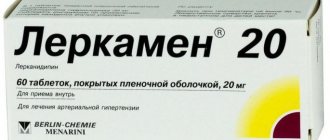Bicalutamide
Bicalutamide is generally well tolerated. Only in rare cases is the use of bicalutamide discontinued due to side effects caused by the drug. According to WHO recommendations, side effects that bicalutamide can cause are classified according to the frequency of their development as follows: very often - ≥ 10%, often - ≥ 1% and < 10%, infrequently - ≥ 0.1% and < 1% , rare - ≥ 0.01% and < 0.1%, very rare - < 0.01%, unknown (impossible to estimate based on available data).
Below are the side effects that occurred when using bicalutamide 150 mg once daily and when using bicalutamide 50 mg once daily with GnRH analogues.
Blood and lymphatic system disorders
often: anemia.
Immune system disorders
uncommon: hypersensitivity reactions (including angioedema and urticaria*).
Mental disorders
often: decreased sexual desire (libido), depression.
Nervous system disorders
very often: dizziness**;
often: drowsiness, headache*, paresthesia*, insomnia*, anxiety*.
Vascular disorders
very often: hot flashes**;
often: arterial hypertension*.
Heart disorders
Common: myocardial infarction (fatal cases reported)*;
uncommon: heart failure.
Gastrointestinal disorders
very often: abdominal pain**, constipation**, nausea**, diarrhea*;
often: dyspepsia, flatulence, vomiting*.
Respiratory, thoracic and mediastinal disorders
very often: shortness of breath;
often: increased cough*, pharyngitis*, bronchitis*, pneumonia*, rhinitis*;
uncommon: interstitial lung disease (fatal cases reported) (post-marketing experience).
Disorders of the liver and biliary tract
often: transient changes in the liver (hepatotoxicity), incl. increased activity of “liver” transaminases, jaundice, increased activity of alkaline phosphatase* (the described changes in liver function were rarely assessed as serious, often were transient in nature, completely disappeared or decreased after discontinuation of the drug);
rarely: liver failure (a cause-and-effect relationship with taking bicalutamide has not been reliably established) (post-marketing experience).
Skin and subcutaneous tissue disorders
very common: rash***;
Common: alopecia, hirsutism/hair regrowth, dry skin, itching, increased sweating*.
Musculoskeletal and connective tissue disorders
often: bone pain*, myasthenia gravis*, arthralgia*, arthritis*, back pain*, pathological fractures*.
Renal and biliary tract disorders
very often: hematuria**, urge to urinate at night*;
Common: urinary tract infection*, frequent urination*, urinary retention*, urinary dysfunction*, urinary incontinence*.
Genital and breast disorders
very often: gynecomastia (may persist even after cessation of therapy, especially if the drug is taken for a long time) and tenderness of the mammary glands;
often: impotence/erectile dysfunction.
Endocrine system disorders
often: hyperglycemia*;
frequency unknown: decreased glucose tolerance (post-marketing experience)*.
Metabolic and nutritional disorders
very often: asthenia;
often: anorexia, weight gain, weight loss*.
General and administration site disorders
very often: chest pain**, peripheral edema**, pain*, pain in the pelvic area*, infections*;
often: influenza-like syndrome*.
* These side effects were observed only when taking bicalutamide (50 mg once daily) concomitantly with GnRH analogues.
** These side effects were observed when using bicalutamide 150 mg once a day and were common, but not very common.
***These side effects were observed when bicalutamide (50 mg once daily) was co-administered with GnRH analogues frequently, but not very often.
pharmachologic effect
Pharmacodynamics.
Antitumor drug, antiandrogenic non-steroidal drug.
Bicalutamide is a racemic mixture with non-steroidal antiandrogenic activity predominantly of the (R)-enantiomer and has no other endocrine activity. Bicalutamide binds to androgen receptors and, without activating gene expression, suppresses the stimulating effect of androgens. The result of this is the regression of malignant neoplasms of the prostate gland.
In some patients, discontinuation of bicalutamide may lead to the development of a clinical "antiandrogen withdrawal syndrome".
Pharmacokinetics.
Suction and distribution
After oral administration, it is quickly and completely absorbed from the gastrointestinal tract. Eating does not affect absorption.
With daily administration of bicalutamide, the concentration of the (R)-enantiomer in plasma increases approximately 10-fold due to a long T1/2, which makes it possible to take the drug once a day. When taking bicalutamide daily at a dose of 50 mg, the Css (R) enantiomer in plasma is about 9 μg/ml. When taking 150 mg of bicalutamide daily, the Css(R)-enantiomer is approximately 22 μg/ml. At steady state, about 99% of all enantiomers circulating in the blood are the active (R)-enantiomer.
Plasma protein binding is high (for the racemic mixture 96%, for the (R)-enantiomer 99.6%).
Metabolism and excretion
Intensively metabolized in the liver (by oxidation and the formation of conjugates with glucuronic acid). Metabolites are excreted in urine and bile in approximately equal proportions.
The (S)-enantiomer is excreted from the body much faster than the (R)-enantiomer, T1/2 of the latter is about 7 days.
Pharmacokinetics in special clinical situations
The pharmacokinetics of the (R)-enantiomer are not affected by age, renal impairment, or mild to moderate liver dysfunction. There is evidence that in patients with severely impaired liver function, the elimination of the (R)-enantiomer from plasma is slowed down.
Contraindications
Absolute:
- combined use with terfenadine, cisapride and astemizole;
- individual intolerance to the components of the drug.
In addition, Bicalutamide is not prescribed to women and children.
Relative (Bicalutamide is prescribed with caution in the presence of the following diseases/conditions):
- functional liver disorders;
- lactose intolerance, glucose-galactose malabsorption and lactase deficiency.
Drug interactions
There are no data on pharmacokinetic or pharmacodynamic interactions between bicalutamide and GnRH analogues.
In vitro studies have shown that the (R)-enantiomer of bicalutamide inhibits CYP3A4, with a lesser effect on the activity of CYP 2C9, 2C19 and 2D6. The potential for interaction of bicalutamide with other drugs has not been detected, however, when used for 28 days while taking midazolam, the AUC of midazolam increases by 80%.
Incompatible with terfenadine, astemizole, cisapride. Caution should be exercised when prescribing bicalutamide concomitantly with cyclosporine or calcium channel blockers. It may be necessary to reduce the dose of these drugs, especially if the effect is potentiated or side effects develop. After initiation or discontinuation of bicalutamide, careful monitoring of cyclosporine plasma concentrations and the patient's clinical condition is recommended.
Concomitant use of bicalutamide and drugs that inhibit microsomal oxidation of drugs, such as cimetidine or ketoconazole, may lead to increased plasma concentrations of bicalutamide and possibly an increased incidence of side effects.
Enhances the effect of coumarin anticoagulants, incl. warfarin (competition for binding to proteins).
Release form and composition
Dosage form: film-coated tablets: biconvex, round, white, engraved on one side (depending on dosage) “50” or “150”; color on the cross section – white (in blister packs of 7 pcs., in a cardboard pack of 3 or 4 packs; in blister packs of 10 or 30 pcs., in a cardboard pack of 1–6, 10 packs; in blister packs of 1–6, 10 packs 14 pcs., in a cardboard pack of 2 or 20 packs; in polymer or glass dark jars of 10, 20, 21, 28, 30, 40, 50, 60 or 100 pcs., in a cardboard pack of 1 jar; each pack also contains instructions for use of Bicalutamide).
Composition of 1 tablet:
- active substance: bicalutamide – 50 or 150 mg;
- auxiliary components (50/150 mg): lactose monohydrate – 61/183 mg; sodium carboxymethyl starch – 7.5/22.5 mg; povidone – 5/15 mg; Magnesium stearate – 1.5/4.5 mg;
- shell (50/150 mg): film coating (titanium dioxide, macrogol, hypromellose) – 3.8/11.3 mg.
Indications for use
Advanced prostate cancer in combination with a GnRH analog (gonadotropin-releasing hormone) or surgical castration;
locally advanced prostate cancer (T3-T4, any N, M0; T1-T2, N+, M0) as monotherapy or adjuvant therapy in combination with radical prostatectomy or radiotherapy;
locally advanced non-metastatic prostate cancer in cases where surgical castration or other medical interventions are not applicable or appropriate.
special instructions
Given the possibility of slower elimination of bicalutamide and its accumulation in patients with impaired liver function, it is advisable to periodically evaluate liver function. Most changes in liver function occur during the first six months of treatment with Bicalutamide-Teva. If significant changes in liver function develop, bicalutamide should be discontinued.
In patients with disease progression due to an increase in prostate-specific antigen (PSA) levels, discontinuation of treatment with Bicalutamide-Teva should be considered.
When prescribing Bicalutamide-Teva to patients receiving coumarin anticoagulants, it is recommended to regularly monitor prothrombin time.
Patients with lactose intolerance should be informed that each Bicalutamide-Teva 50 mg tablet contains 35 mg of lactose monohydrate, each 150 mg tablet contains 105 mg of lactose monohydrate.
Given the possibility of bicalutamide inhibiting the activity of cytochrome P450 enzymes (CYP3A4), caution should be exercised when co-administering Bicalutamide-Teva with drugs predominantly metabolized by CYP3A4.
Impact on the ability to drive vehicles and other mechanisms that require increased concentration
During the treatment period, care must be taken when driving vehicles and engaging in other potentially hazardous activities that require increased concentration and speed of psychomotor reactions.
Directions for use and doses
Adult men (including elderly):
For advanced prostate cancer, in combination with a GnRH analogue or surgical castration, 50 mg is prescribed orally 1 time per day. Treatment with Bicalutamide-Teva should be started simultaneously with the initiation of a GnRH analogue or surgical castration.
For locally advanced prostate cancer, 150 mg is prescribed orally 1 time/day. Bicalutamide-Teva should be taken long-term, for at least 2 years. If signs of disease progression appear, the drug should be discontinued.
In case of impaired renal function, no dose adjustment is required.
For mild liver dysfunction, no dose adjustment is required. Increased accumulation of bicalutamide may be observed in patients with moderate to severe hepatic impairment.


